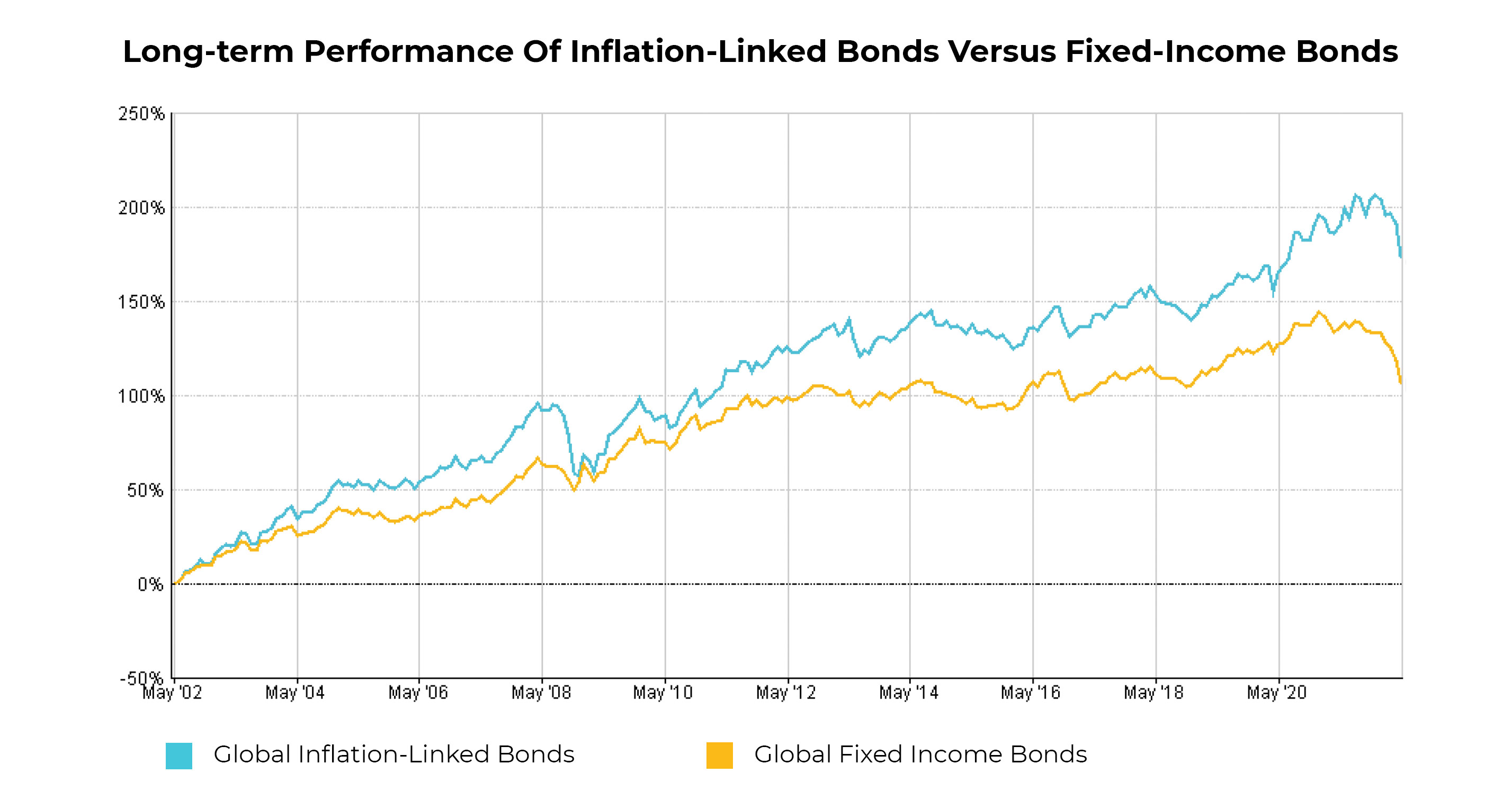Drawing inspiration from Dickens' A Christmas Carol, Bryan Bann explores how you can enjoy the holidays now without sacrificing your future.
This is a div block with a Webflow interaction that will be triggered when the heading is in the view.
Bonds, otherwise known as fixed-income, have a problem with inflation. When inflation rises, bonds’ fixed payments become worth less. There is a type of bond, however, that can overcome this issue – inflation-linked bonds.
With inflation currently higher than it’s been for many years, inflation-linked bonds have garnered a lot of attention recently among investors. So in this article we’ll explain what they are, their pros and cons, and whether we think they could be useful for your portfolio.
What Are Inflation-Linked Bonds?
Inflation-linked bonds are known as treasury inflation-protected securities (or TIPS) in the US and index-linked gilts (or ‘linkers’) in the UK. In many ways they’re similar to conventional fixed-income bonds. They’re issued by an entity, usually governments, looking to raise money and in return will pay bondholders (the investors) interest and return the value of the bond when it matures.
Unlike fixed-income bonds, however, inflation-linked bonds’ face value (the sum of money paid back at maturity) rises in line with inflation. As their interest payments are a percentage of the face value, these rise with inflation too. In investing you can rarely have your cake and eat it though, so inflation-linked bonds usually offer lower yields than fixed-income bonds to reflect their inflation-busting benefits.
The difference in yields between inflation-linked and fixed-income bonds is called the ‘breakeven rate’ and is used to indicate market inflation expectations. So for example, if 10-year fixed-income government bonds are yielding 3% and 10-year inflation-linked bonds are yielding 1%, the market is expecting 2% annual inflation over the next 10 years.
Are inflation-linked bonds a good investment?
As with all investments there are pros and cons to inflation-linked bonds. Aside from offering protection from inflation, like with most government bonds they’re considered a low-risk investment. They also have a low correlation with equities, so they usually perform very differently to the stock market. That means they offer a good level of diversification to equities and can be used to lower overall portfolio volatility, making them an attractive option for more balanced and cautious investors.
Like with most lower-risk investments though, inflation-linked bonds’ growth potential is limited. They should be viewed more as portfolio ballast, rather than as a main driver of returns. Their low-risk nature also doesn’t mean they’re immune to short-term falls.
Like fixed-income, inflation-linked bonds are affected by changes in interest rates. They have an inverse relationship, so if rates fall it’s generally good news for bonds as their prices tend to rise, but if rates go up prices can fall. So even though inflation-linked bonds benefit from rising inflation that can be more than offset by the impact of rising interest rates.
The success of inflation-linked bonds versus fixed-income also depends on whether inflation ends up at, above or below expectations. Given their prices and yields reflect anticipated inflation, if expectations turn out to be correct, all else equal, inflation-linked bonds should end up no better, no worse off than fixed-income. They’ll be better off than fixed-income though if inflation exceeds expectations, but won’t do as well if inflation is lower than anticipated.
How have inflation-linked bonds performed?
Over the long-term inflation-linked bonds have delivered an average annual return of around 6%. This compares favourably to fixed-income’s approximately 4.5% average annual return but, as expected, is a fair way off the global stock market’s approximately 9% average annual figure.
Inflation-linked bonds have been more volatile than fixed-income though, falling 7.7% for example in 2008 while fixed-income actually rose 4.8%. Still, they held up significantly better than the stock market, which fell over 40% that year. Remember though that none of these performance figures will necessarily be the case in the future.

We think inflation-linked bonds are a great way to provide portfolio diversification, lower volatility and protect from spikes in inflation. You won’t find us making predictions on whether inflation is set to rise or fall and by how much though. That’s an extremely difficult thing to do and runs the risk of getting it wrong, just as many investors have been taken by surprise by the recent jolts.
Instead, inflation-linked bonds form an evergreen part of our ‘all-weather’ approach to building investment portfolios, where we include different types and styles of investments that work well in different conditions. That means whatever is happening to inflation, or markets or economies, there should always be something benefitting or providing protection within the portfolios.
Ordered list
Unordered list
Ordered list
Unordered list

